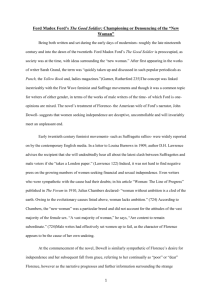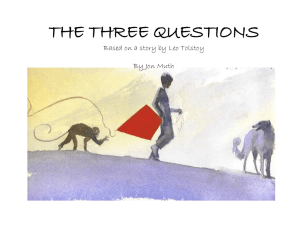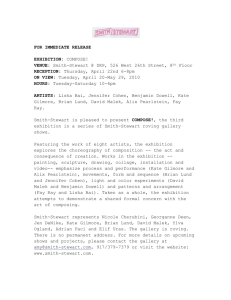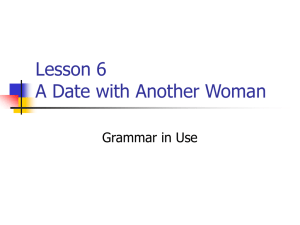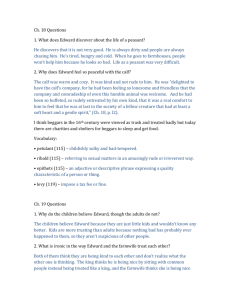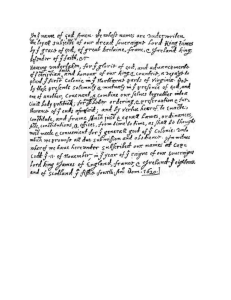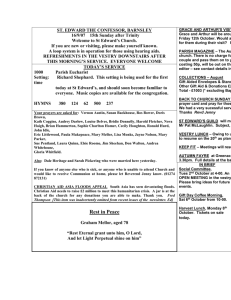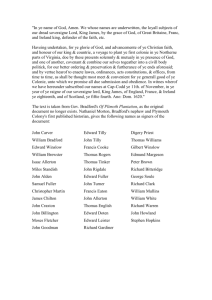good soldier.doc - Agreg-ink
advertisement
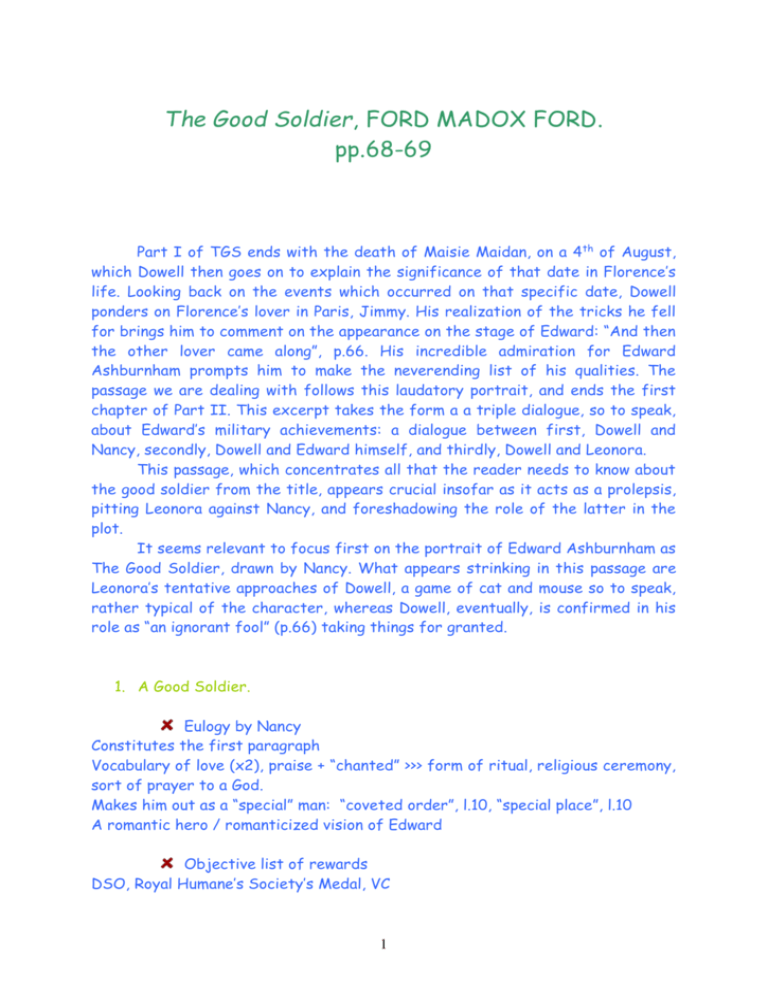
The Good Soldier, FORD MADOX FORD. pp.68-69 Part I of TGS ends with the death of Maisie Maidan, on a 4th of August, which Dowell then goes on to explain the significance of that date in Florence’s life. Looking back on the events which occurred on that specific date, Dowell ponders on Florence’s lover in Paris, Jimmy. His realization of the tricks he fell for brings him to comment on the appearance on the stage of Edward: “And then the other lover came along”, p.66. His incredible admiration for Edward Ashburnham prompts him to make the neverending list of his qualities. The passage we are dealing with follows this laudatory portrait, and ends the first chapter of Part II. This excerpt takes the form a a triple dialogue, so to speak, about Edward’s military achievements: a dialogue between first, Dowell and Nancy, secondly, Dowell and Edward himself, and thirdly, Dowell and Leonora. This passage, which concentrates all that the reader needs to know about the good soldier from the title, appears crucial insofar as it acts as a prolepsis, pitting Leonora against Nancy, and foreshadowing the role of the latter in the plot. It seems relevant to focus first on the portrait of Edward Ashburnham as The Good Soldier, drawn by Nancy. What appears strinking in this passage are Leonora’s tentative approaches of Dowell, a game of cat and mouse so to speak, rather typical of the character, whereas Dowell, eventually, is confirmed in his role as “an ignorant fool” (p.66) taking things for granted. 1. A Good Soldier. Eulogy by Nancy Constitutes the first paragraph Vocabulary of love (x2), praise + “chanted” >>> form of ritual, religious ceremony, sort of prayer to a God. Makes him out as a “special” man: “coveted order”, l.10, “special place”, l.10 A romantic hero / romanticized vision of Edward Objective list of rewards DSO, Royal Humane’s Society’s Medal, VC 1 + heroic deeds, the same which leonora despises. + demultiplication of the deeds: “twice” (x2), emphasizes the list of brave actions Undermined by the choice of vocabulary When Dowell recounts Nancy’s speech, voc. of appearances: “apparently”, l.5-10, “whatever that might mean”, l.9, “perhaps”, l.11-14 This is the only passage really which contributes to explaining the title of the novel, as elsewhere Edward is not so much presented as a soldier (episode La Dolciquita, moved to India) V.C >>> everybody knows that it is a very high military distinction, so Dowell’s remark (quote) is hard to understand >>> may be explained by the fact he is foreign but not convincing. What seems maybe more convincing : Dowell is in fact re-telling what happened in the light of further developments, the undermining of Edward’s achievements may thus be a result of talks with leonora. + Edward’s comment 2. Leonora’s tentative approach of Dowell. Careful speech Marked by punctuation (ll.41-45): abundance of dashes, which interrupt the rhythm and the flow of the passage. Translates L’s careful choice of words. Vocab: “slowly”, x2 “for what seemed like a long time” + “for a long time” >>> pauses to choose her words Also may recall scene protest: she thinks Dowell understands whereas he doesn’t. L. carefully repeats Dowell’s words, yet her tone seems ironic, or at least it seems to raise some questions ll.32-33 Two-fold speech intended to raise doubts in Dowell’s mind, without seeming to. ll.46-47: indicates her doubts as far as her husband’s qualities are concerned. Marriage is a pretence: keep up a public image; very English attitude. ll. 56-57 “Didn’t you know?”, l.28, looking for D’s real opinion? “It’s your opinion that there are no other lines that count?”, l.38 Prolepsis: future role of Nancy Nancy is never named 2 “the girl”, l.6,47: asexual being, not a woman, but this is true throughout the novel. “your ward” l.40 deprives her of an identity, not coneived as a threat, or indeed, so threatening she is not named? + “any other woman”, l.51-52 not girl, woman, not perceived as a threat this way of referring to nancy as “the girl” seems typical of Dowell’s speech (cf. “Now I can marry the girl”, quite strange he shouldn’t mention her name in such a context) which brings us to his role in the excerpt. 3. Dowell: an “ignorant fool”. Vision of himself as an observer “a man sees...” l.49 “I should have noticed”, l.52 “would you believe it?” l.42, of course at that point the reader / listener is ready to believe anything, Dowell already appears as a fool since the disclosure of F’s fake heart condition / ironic statement. Discrepancy between Dowell’s vision of himself and real life; the two mingled by the narrator’s (Dowell but an enlightened Dowell) comments. Passive character who doesn’t have a clue, cf final sentence: nearly dramatic irony as the reader already knows what has gone on (multiple prolepsis beforehand) the reader does just that the whole time: think how much of a fool he is! Irony again: “I asked her fully and squarely” hum... a question which only brings one answer from a well-educated Lady. Taking things for granted (ie: medals> good person) E’s dismissal of D’s inquiry : grunts, seems to despise the whole thing ist of medals and military honours: doesn’t mean much to Dowell as seen before Yet: “along at least the lines of his public functions” (l.24-25) Implies this is only one side of the coin Doesn’t know Edward that much: it’s Nancy who reveals all this to him. This raises the question of private and public sides of a character: Dowell himself acknowledges he finds it hard to know people really (ll.21-23) The expression “along those lines” x 5, ll. 24, 30, 33, 35, 37 L. emphasizes or at least tries to point out the different between “public functions” and private man But Dowell doesn’t pick up: l.35 Takes for granted that medals are a reflection of the value of the character 3 Doesn’t realize the discrepancy between the show (“the scene”) put on by L+E, and reality Kilsyte case mentioned Because L stuck up for her husband D believes he was innocent Assumes all people who know the two think the same Conclusion: Excerpt which confirms the major protagonists in their already given roles Leonora as a woman who is intent on keeping up appearances Dowell ignorant fool, One who prides himself on being an observer of human nature yet misses any hint available Nancy arises discreetly as the cause of future trouble Only excerpt where E’s military career is mentioned in so much detail: apart from passage where L criticizes deeds; seems to be worthy of D’s admiration and yet, the passage subtly undermines the positive things that are said about Edward. 4
